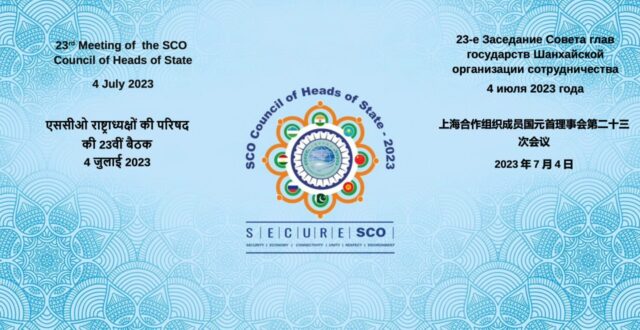Iran’s Entry into the SCO: A Game-Changer in Eurasian Geopolitics

Geopolitical Report ISSN 2785-2598 Volume 32 Issue 1
Author: Silvia Boltuc
Iran’s admittance to the Shanghai Cooperation Organization (SCO) as a full member is a noteworthy step that has greatly impacted the geopolitical arena of the region.
The declaration made by the SCO Council of Heads of State in New Delhi confirmed Iran’s entry into the organisation, marking a pivotal moment in the geopolitical landscape of Eurasia, holding potential implications for regional security, economic connectivity, and the dynamics of global power rivalries.
Information Background
The SCO summit, hosted by India, provided a platform for member countries to discuss key issues, including regional security, economic connectivity, and trade.
The virtual summit saw the participation of prominent leaders such as Chinese President Xi Jinping, Russian President Vladimir Putin, Pakistani Prime Minister Shehbaz Sharif, and Iranian President Ebrahim Raisi.
During the event, Indian Prime Minister Modi expressed his delight at Iran’s accession to the SCO, emphasising the potential for collaborative regional infrastructure projects such as the Chabahar transport corridor.
President Xi Jinping and President Putin also extended their congratulations to Iran on its membership.
Analysis of Iran’s SCO membership
Iran’s inclusion as the ninth official member of the SCO holds several implications for the organisation.
Firstly, it can strengthen the security foundations of the SCO by aligning with its primary security goals, which include countering terrorism, separatism, and extremism. Iran has showed its capability and motivation to combat terrorism, ensuring internal security and extending its reach to neighbouring countries.
Indeed, Tehran cooperated with Syria and Iraq in fighting terrorist groups, particularly contrasting the Islamic State, which has as a primary target the Shia minority. Iran’s efforts to confront drug cartels and organised crime groups from Afghanistan and Pakistan further reflect its commitment to maintaining stability in the region and along its border.
The Islamic Republic’s geographical location plays a crucial role in strengthening the SCO’s economic connectivity. Iran acts as a link between the four major regions of the organisation, which include Central Asia, South Asia, West Asia, and the Caucasus.
The country’s infrastructure, including ports, railways, and highways, serves as vital transnational routes for major economic projects such as the Belt and Road Initiative and the International North-South Transport Corridor. Notably, Tehran is investing to further develop its industries and infrastructures, as well as creating free economic zones, to enhance its role as a regional transit hub.
Iran’s abundant oil and gas resources also position it as a valuable participant in the SCO’s energy club, contributing to the organisation’s economic development.
In terms of economic development, with its large population, natural resources, and an educated workforce, Tehran can play a significant role in enhancing trade and economic cooperation among the member states.
Conclusion
In conclusion, Iran’s membership in the SCO signifies a significant step forward in the project of Eurasian regional integration and cooperation and effort to counter security problems. This shared goal is not exclusive to the Islamic Republic alone, but also resonates with the ambitions of the People’s Republic of China and the Russian Federation.
Tehran’s membership further reinforces recent developments on the Eurasian chessboard, which have been accelerated by the Ukraine conflict. It underscores the need for closer regional collaboration to address emerging challenges and seize new opportunities.
The Islamic Republic’s active engagement within the SCO positions it as a key participant in shaping the geopolitical dynamics of Eurasia, emphasising the growing significance of regional partnerships in global affairs.
By joining the SCO, Iran takes a significant stride towards enhancing Eurasian connectivity, promoting economic cooperation, and facing regional security challenges. The SCO platform enables Iran to leverage its strategic location, resources, and cultural heritage to contribute to the organisation’s objectives of stability, development, and shared prosperity.
Considering these factors, this membership represents a pivot for the Eurasian region. It reinforces Beijing, Moscow, and Tehran’s narrative that it is possible to creating a multipolar world where diverse countries, organisations, and projects can thrive, challenging what they consider the traditional dominance and control of a single power.
As Iran assumes its role within the SCO, it positions itself as a key player in shaping the future of Eurasia, charting a path towards a more interconnected and balanced world order.
Do you like SpecialEurasia reports and analyses? Have our groundbreaking research empowered you or your team? Now is your chance to be a part of our mission! Join us in advancing independent reporting and unlocking the secrets of Eurasia’s complex geopolitical landscape. Whether through a one-time contribution or a monthly/yearly donation, your support will fuel our relentless pursuit of knowledge and understanding. Together, let’s pave the way for a brighter future. DONATE NOW and secure your place in shaping the geopolitical narrative.
